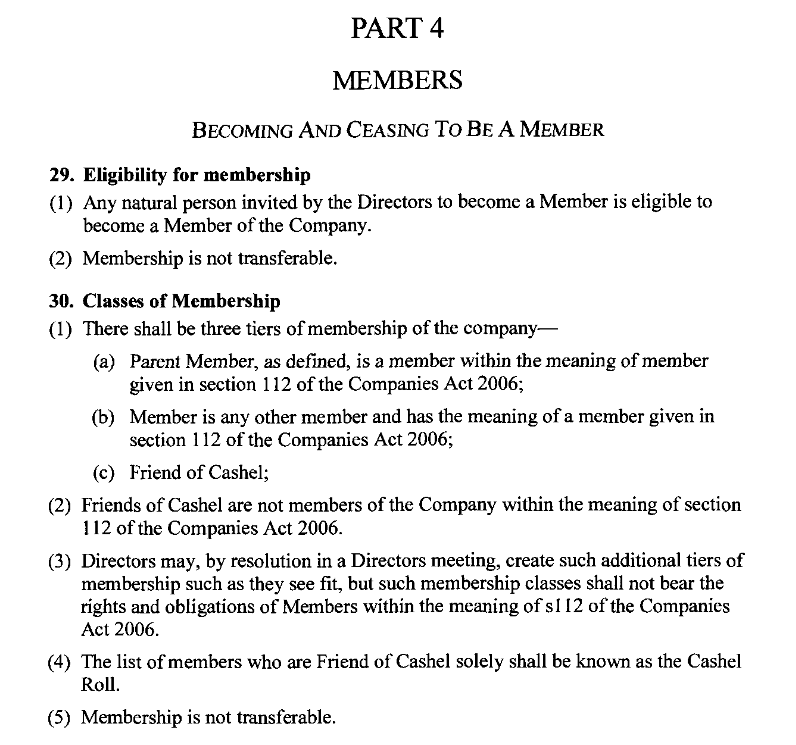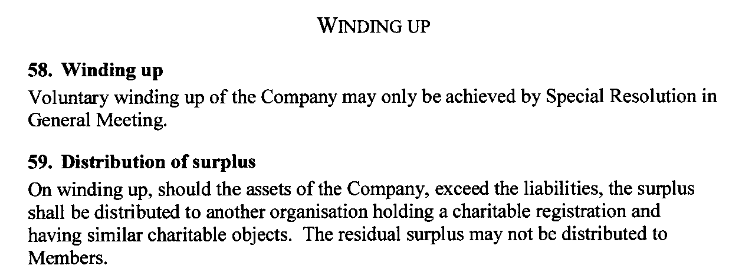Following my post (see here) on how the Royal Scottish Forestry Society (RSFS) are cashing in on Cashel , Andy Wightman wrote a fine follow up piece on the Cashel estate and the post war labour government. This filled in some of the historical gaps and demonstrated how the public ownership of land was once valued far more by the state than it is now.
On Monday in a significant development, a former manager for the Millenium Forest Trust which funded the Cashel woodland creation project, was reported by Vicky Allan in the Herald as calling for the sale to be halted (see here). Many members of the RSFS appear to believe the same. The pressure they have been exerting appears to be responsible for two emails to them from their vice-President, Raymond Henderson, a former head of forestry at Bidwell’s and also acting chair of the Cashel Forest Trust.

This first email was playing with words. The Memorandum and Articles of Association adopted by the Cashel Trust in 2019 (see here) show that the RSFS is the “Parent Member” of the Cashel Trust:

As such, the RSFS has special status and powers over the Cashel Trust which is effectively a wholly owned subsidiary, under company law:

I have been unable to ascertain whether the Cashel Forest Trust has any tier 2 and tier 3 members. There is nothing, for example, on the Cashel Forest Trust website about how to become a Friend of Cashel (see here) and nothing on the membership section of the RSFS website (see here) either. Moreover, while the Memorandum and Articles of Association of the Cashel Trust contain the usual provisions for general meetings of members, no such meetings appear to have been advertised or recorded on the Cashel Forest Trust website. It appears, therefore, that the only member of the Cashel Forest Trust may be the RSFS. If so, Mr Henderson’s claim that the Cashel Forest Trust is a separate body, over which the RSFS has “influence” but takes its own decisions, is highly misleading.
Indeed, all three office bearers of the RSFS (see here), which is registered with the Office of the Scottish Charity Regulation as a Scottish Charitable Incorporated Organisation (see here), are also Directors/Trustees of the Cashel Forest Trust:
- Raymond Henderson (vice-President)
- Wilma Harper (President)
- Dr Tom Mitchell (Treasurer)
Given these facts, it is clear that all three RSFS office-bearers must have been fully party to the decision to sell the Cashel Forest and were possibly the main driving force behind it. What is also clear is that these three office-bearers failed to consult the RSFS membership who first heard about the proposed sale the day before it was announced.
The second claim in the email (underlined in red) suggesting that the Cashel Forest Trustees (including the office bearers of the RSFS) do not want to sell the whole estate, only to sell part of it to raise money to manage the rest, is extraordinary. If that really was the intention the trustees should only have marketed the part of the estate they wanted to sell.
The second email, which appears to have been in response to further pressure from RSFS members, invites them to a Question and Answer session about the proposed sale at Cashel on 15th August:
From: RSFS Treasurer <treasurer@rsfs.org.uk>
Subject: Cashel update meeting
Date: 18 July 2024 a
To:
Reply-To: treasurer@rsfs.org.uk
Dear Member,
I am writing to invite you to a Question and Answer Session being organised by the RSFS taking place at Cashel Visitor Centre on 15th August, beginning at 1:30pm and concerning the proposed sale of Cashel Estate by Cashel Forest Trust. The meeting will be chaired by Fenning Welstead. Members of the CFT Board will be present too.
A sandwich lunch will be available from 12:30pm. For those unable to travel to Cashel, we are aiming to broadcast the session simultaneously on MS Teams.
Please RSVP using this form https://forms.office.com/e/GbaHB2eKcFto indicate if you intend to attend in person (for lunch numbers and dietary requirements) or digitally (to send dial-in links to).
Kind regards
Raymond Henderson
Vice President
Fenning Welstead who is chairing the meeting is not a trustee for Cashel Forest Trust but is a trustee for the RSFS (representing their central region). Maybe that was why he was asked to chair the meeting? If so it is an extraordinary inappropriate choice: Fenning Welstead works in the Land and Forestry Team (see here) at Goldcrest, the company which is marketing the property! Even if Goldcrest have waived all their fees this is not a good look.
It is not clear from Mr Henderson’s invite which of the Cashel Forest Trustees will be at the meeting to explain why they decided to market a property, purchased and developed with over £1.4m of public money, without any consultation. One would hope hat all three of the RSFS office-bearers, in their capacity as trustees of the Cashel Trust, will be present and be prepared to explain their actions to date.
While the Cashel Forest trustees may all owe their appointment to the RSFS, they are not accountable to it in relation to any potential disposal of the assets:

Up until now the Cashel Forest trustees have not said anything about which charity might benefit from the (£4m) surplus if the property is sold. Under the Articles and Memorandum of Association, however, that surplus cannot be distributed to members and that would appear to preclude the money going to the RSFS. I suspect many RSFS members will want to know just who do the trustees think should benefit and why they simply didn’t gift the property to another charity instead of trying to sell it off in lots.
What needs to happen
Below is the complete lists of the current trustees/directors of the Cashel Forest Trust taken from the companies house website:
- CGPM CONSULTING LLP (Company Secretary)
- ALLAN, Christopher William
- HARPER, Wilma Carol Grant
- HENDERSSON, Raymond
- MOTION, Alison Joyce
- PHILLIPS, Peter Metcalfe
- MITCHELL, Dr Thomas
- ROBERTSON, James Ian Alexander
While all formally bear equal responsibility for the decision to try and sell off the Cashel Forest, the three trustees who are also office-bearers of RSFS, the parent member, are likely to have played the key role. I would suggest therefore that pressure needs to be put on Wilma Harper, Raymond Henderson and Thomas Mitchell to explain how the decision to sell Cashel Forest was either in the public interest or that of the RSFS.
I would also suggest that a further independent investigation by the Office of the Scottish Charity Regulator into how the Cashel Trust has been managed (are there any other members apart from the RSFS for example) and the various relationships between the trustees, the Scottish Government (Peter Philips is head of natural capital investment at the Scottish Government) and private finance interests in the forestry industry would be appropriate.

As an RSFS member, and setting aside the detail, there is one thing in here that I agree with, and one thing that I don’t.
Where I agree is that it is not acceptable to be told the day before about such a sale. Whatever the legal ownership structure, Cashel has always been regarded as an RSFS project, and by far our most significant one. So, that was very badly done.
Where I disagree I think is that public money being paid to Cashel does not mean that it therefore needs to be transferred to another public or approved NGO body to save this. If Cashel had stayed as an upland sheep farm, then the subsidies received over 25+ years would have been a lot more than the investment through other channels. That money comes from the same source.
To me, what Cashel shows is that managing a piece of land takes resources, and in the absence of farming/ forestry/ sporting or other income, making things pay is difficult/ near impossible, and that puts pressure on the owners. If Cashel was transferred to a public body, or an NGO, you can be pretty sure the public purse would be paying for it, or the begging bowl would be out to NGO members and supporters. No doubt they would come up with some fundraising catch phrase similar to the “Forest for a Thousand Years”.
This might not be the right thing to say but I have never been convinced that Cashel was ever the strategic asset it was portrayed as. There are any number of better woods in Scotland from which we can learn, more easily accessible, wider range of woodland types, and part of a bigger holding, so more financially secure. For most people, Cashel is the back end of beyond.
So, I don’t object at all to Cashel being sold, especially if silly money is possible. And if the money can be invested in forest research or in building up the society, then frankly the public good arising from that would be much better value than gifting it to some other body which will simply use it as a vehicle for milking the public purse for ever more. RSFS is a fundamentally solid organization which many people are happy to be associated with. Cashel is not that important in the big scheme of things, as long as the comms are improved dramatically.
The law protects the woodland created, so the public interest is secured, and the LLTNPA SHOULD be able to protect it against inappropriate development.
There are some curiosities and peculiarities hovering around this sale.
1. Everyone is apparently in the dark about where the funds generated by the sale of Cashel will go…. surely this should have been clarified clearly from the outset prior to making the decision to sell?
2. What has been done to deal with any conflicts of interest across the Cashel Trustees and RSFS office bearers?
3. Should a civil servant such as Peter Phillips be involved directly as a Trustee of such a valuable non government asset? Professional advisor yes possibly OK, but as a Trustee?
4. Why the silence leading up to the sale?
5. Why were RSFS members not consulted directly before the decision to sell was made
6. Why are so many people close to this sale make a commercial living from buying and selling forest land?